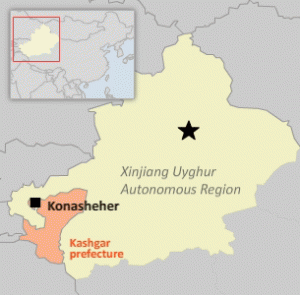
Police shot dead 14 people in China’s far west region of Xinjiang — an area where many Muslims are resentful of the Chinese government — after a group of assailants attacked officers with explosive devices and long knives, state media reported Monday.
The attackers killed two policemen late Sunday when police were arresting “criminal suspects” in a township near the Silk Road city of Kashgar, reported Tianshan, a local government news portal.
Police “decisively handled” the attack, shooting the assailants and arresting two suspects, it said.
Xinjiang, China’s huge slice of Central Asia, experiences regular bouts of unrest. Many of its mostly Muslim Uighur people resent the political and economic domination of their homeland by China’s ruling Communist Party and the majority Han ethnic group.
Uighurs are suspected in a terror attack at Tiananmen Square in October that killed five people.
A spokesman for one Uighur exile group challenged the Chinese government’s version of the killings in Xinjiang and said Chinese security forces increasingly opt to kill suspects at the scene.
“They are now opening fire and killing people, then calling them terrorists,” Dilxat Raxit, the Sweden-based spokesman for the exiled World Uyghur Congress, told the Associated Press. “This deprives them of their right to defend themselves in a court.”
China’s Ministry of Foreign Affairs called the attackers a “violent terror gang” Monday.
“It once again showed the true face of violent terror. It should be condemned by all people who love peace and stability,” spokeswoman Hua Chunying told a daily news briefing in Beijing.
The Chinese government claims to be fighting rising militancy in Xinjiang, and blames foreign provocateurs for stirring up trouble between the Uighur and the Han peoples and trying to promote Xinjiang independence.
More than 190 “terrorist” attacks happened in Xinjiang in 2012, a “significant” increase over 2011, the Oriental Outlook magazine, owned by the Xinhua state news agency, reported in November.
This usually remote problem burst into the heart of Beijing in October when five people died as a car rammed through a crowd and burst into flames beside Tiananmen Square. Chinese police said the three people who died inside the car were Uighurs from Xinjiang, carrying out an attack inspired by Xinjiang extremists.
Most violent incidents in Xinjiang in recent years were based on local issues and grievances rather than connections to wider, radical Islamist movements, according to Michael Clarke, an expert on Xinjiang at Australia’s Griffith University.
Uighur disenchantment is fueled by the feeling that Uighurs and other ethnic minorities have been sidelined by the Han-led economic modernization agenda, he said. They also suffer ethnic discrimination in state policy from education through to the religion, where restrictions on Islamic schools are seen by some as a direct attack on Uighur identity, said Clarke.
While ethnic and religious tensions in Tibetan areas are better known worldwide, Xinjiang arguably worries China’s Communist Party leaders more than Tibet. Beijing maintains a highly visible security presence in many Xinjiang cities and towns. About three-quarters of people arrested in China on suspicion of “endangering state security” in 2012 were from Xinjiang, the U.S.-based human rights group Duihua said last month.
The troubles in Xinjiang are rarely documented in China’s state-run media, which prefers images of smiling, dancing ethnic minorities. In a booklet called “Understanding Xinjiang,” distributed at China’s annual session of parliament this March, one section was titled “Xinjiang natives are carefree” and claimed China’s regional autonomy system ensured Xinjiang residents the right of “being the real masters of their own lives and destiny.”
Beijing hopes to develop already thriving tourism to Xinjiang, exploiting its Silk Road past. One plan involves opening a theme park later this month in Shufu county, where Sunday’s attack allegedly occurred.
The park will be “Xinjiang’s Disneyland,” local media said in June, and themed after Afanti, known to the rest of the Turkic-speaking world as the wise fool Nasreddin.
“The stability of our region is very important for our daily life and economy,” said a Uighur veterinarian in Kashgar, who uses the Chinese name Li Lei, and said his pet care business is growing as more local people can afford to keep pets. “National unity is the most important thing for Xinjiang, I really don’t like incidents like this, I wish everybody in Xinjiang could live in peace,” he said.
USA Today
Leave a Reply
You must be logged in to post a comment.